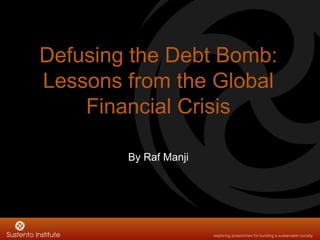
Developing a resilient money system
- 1. Defusing the Debt Bomb: Lessons from the Global Financial Crisis By Raf Manji
- 2. Outline • Global Financial Crisis • New Zealand’s own GFC • Lessons • Debt Addiction • Debt Withdrawal • Moving Forward
- 3. Global Financial Crisis - Overview • Collapse in House Prices • Credit Markets Freeze • Banks collapse in US, UK and Europe • Collapse in Global Stock Prices • Global contagion • Global Recession • European Sovereign Debt Crisis
- 4. Mania Takes Hold - Iceland • Population 320,000, GDP $13 billion, Bank losses $100 billion
- 5. Ground Zero – The US Housing Bubble
- 6. Irrational Exuberance? Prices vs. Rent
- 7. Driven by the Debtmobile
- 8. Financialisation of the Economy
- 9. Causes – The End of History? • Excessive Credit • Speculation • Predatory Lending • Deregulation • Fraud • Risk Modeling • Complexity • Hubris
- 10. The Smartest Guys in the Room – Exhibit A • Long Term Capital Management • Nobel Prize Winners • Finest Finance Faculty in the World • $4b loss • Not so smart after all
- 11. The Smartest Guys in the Room – Exhibit B • Enron • Fortune’s “America’s Most Innovative Company” 1996-2001 • Innovative and complex accounting fraud • One of the biggest Corporate bankruptcy cases in history • Shareholder loss of $11b • Not so smart after all
- 12. The Smartest Guys in the Room – Exhibit C • The Famous Five • Goldman Sachs, Morgan Stanley, Merrill Lynch, Lehman Brothers, Bear Stearns. • 2004: Self-regulation please • 2008: System Meltdown • 2008: $700b taxpayer bailout • Not so smart after all
- 13. European Drama and Greek Tragedy • The Great Fudge • The Big Payoff • The Debt Binge • The Euro Straightjacket • The Hangover • In Between a Rock and a Hard Place
- 14. Nu Ziland – Too Small to Fail? • “Well managed and regulated financial system” – Yeah Right! • Finance Company Collapse: $8.5b funds affected • External debt $147b (71% of GDP) set to grow • Net Public debt $41b (20% of GDP) • Gross Public debt $71b (34% of GDP)
- 15. Nu Ziland – Too Small to Fail?
- 16. Spending more than we earn - since 1973
- 20. Nu Ziland – Too Small to Fail? • Living Beyond Means • Cowboy Capitalism • Sub Prime NZ style • SCF Bailout • Addicted to Debt
- 21. Lessons for NZ • Excessive Credit • Speculation in Housing • Poor regulation • No capital taxes • Complacent Governance • Overseas Ownership • Debt Addiction
- 22. The Debt Based Money System • Nearly all money is created as Interest bearing debt • Created by the private banking system • Exposed by the GFC • Profits privatized, losses socialized • New debt needed to keep the system going • Boom, Bust built in • New approach needed
- 23. Why should Government pay interest? • Government can create its own money • “In the colonies we issue our own money. It is called colonial scrip...we control its purchasing power and we have no interest to pay to no one” Benjamin Franklin, 1764
- 24. Why can’t Government Create Money? • Banks don’t like it • “To repeal the act creating bank notes, or to restore to circulation the government issue of money, will be to provide the people with money and will therefore seriously affect our individual profits as bankers and lenders” James Buel, Secretary, American Bankers Association, 1877
- 25. Who should issue Currency? • Creating currency is a sovereign right • “The issue of currency is a function of the government, a sovereign right which ought not to be delegated to corporations” Professor Davis Rich Dewey, 1902
- 26. NZ Money Supply – 98% Debt
- 27. Monetary Dialysis • Replacing “bad money” (interest bearing debt) with “good money” (notes and coin) • Retiring government debt as it matures • Financing new infrastructure with “good money” • Managing overall growth in money supply • Setting limits on new bank credit (SNB) • Eliminating public debt by 2020
- 28. NZ – Monetary Dialysis Begins
- 29. NZ – Reducing Debt as % of Money Supply
- 30. NZ – No Public Debt by 2020
- 33. Dealing with the Overseas Debt • Foreign Transactions Surcharge (FTS) • Surcharge on all imports • Pay down overseas debt • Lowers exchange rate • Improves Current account • Lowers Interest rates • Lowers foreign ownership
- 34. Moving Forward • Reforming money system • National and Local Money • Rebalancing the Current Account – less Global Money • Living within our limits – Balancing our Budgets • Definancialising our Economy – Value Shift • Reducing housing costs (supply) • Ultimately Reclaiming Sovereignty!
- 35. Mea Culpa “With the benefit of hindsight, we should have shouted from the rooftops that a system had been built in which banks were too important to fail, that banks had grown too quickly and borrowed too much, and that so-called light regulation hadn’t prevented any of this” Governor, Bank of England, Mervyn King, May 2012
- 36. Final Word “Whoever controls the volume of money in any country is absolute master of all industry and commerce...and when you realise that the entire system is very easily controlled, one way or another, by a few powerful men at the top, you will not have to be told how periods of inflation and depression originate” US President James Garfield, 1881
Notes de l'éditeur
- 8% of total GDP and 41% of total corporate profits
